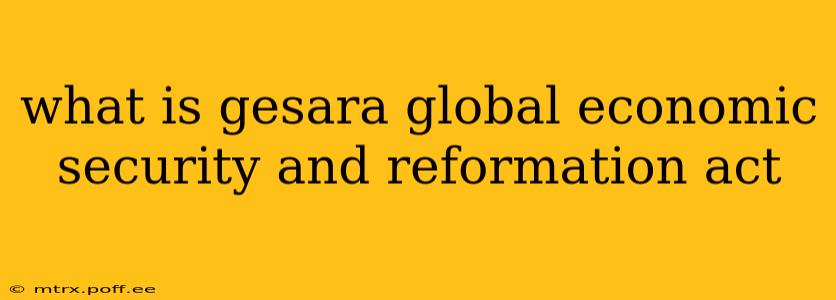The Global Economic Security and Reformation Act (GESARA) is a proposed set of economic reforms that has gained significant traction online, particularly among those who believe in conspiracy theories. However, it's crucial to understand that GESARA is not a real, enacted law in any country. There is no official legislation bearing this name that has been passed by any legitimate government body.
While the details vary across different online sources, the core tenets of the proposed GESARA generally revolve around significant changes to global financial systems, aiming to create a fairer and more equitable economic landscape. These often include claims of debt forgiveness, the establishment of a new gold-backed currency, and an end to income tax. The purported benefits often include a significant increase in individual wealth and a decrease in global poverty.
What are the purported aims of GESARA?
Proponents of GESARA claim that its implementation would achieve several major objectives, although it's essential to emphasize that these are not based on any official government documentation or established economic principles. These claimed aims often include:
- Debt Forgiveness: The cancellation of national debts, both personal and governmental.
- New Global Currency: A shift to a gold-backed currency, intended to stabilize the global financial system and prevent manipulation.
- Income Tax Elimination: The abolishment of income tax, replaced potentially with a sales tax or other alternative revenue streams.
- Increased Prosperity: A significant increase in the wealth and prosperity of the global population.
- Global Peace and Harmony: An end to global conflict and the creation of a more unified and peaceful world.
Is GESARA a legitimate piece of legislation?
No. There's no credible evidence to support the existence of a legitimate GESARA act. The claims surrounding GESARA often circulate in online communities promoting conspiracy theories and are not supported by verifiable information from official government sources or reputable financial institutions. The lack of any official documentation or legislative history makes it impossible to verify its purported aims or outcomes.
Why has GESARA gained popularity online?
The widespread online promotion of GESARA likely stems from several factors:
- Desire for Economic Change: Many people are frustrated with existing economic systems and seek alternative solutions to issues like debt, inequality, and corruption. GESARA provides a seemingly simple and utopian solution, appealing to those who feel marginalized or disillusioned by the status quo.
- Conspiracy Theories: GESARA often features within a broader context of conspiracy theories, suggesting that a secret cabal is secretly working towards its implementation. This narrative can be compelling to those who distrust established institutions.
- Social Media Propagation: The spread of misinformation and conspiracy theories is facilitated by the ease with which such ideas can be shared on social media platforms.
What are the criticisms of GESARA?
The claims surrounding GESARA have been widely criticized for their lack of verifiable evidence and their inherent implausibility. Major criticisms include:
- Lack of Evidence: There is no official documentation, legislative record, or verifiable evidence of any such act ever being proposed or passed by any legitimate government.
- Economic Implausibility: The proposed economic changes are often unrealistic and fail to address the complexities of modern global finance. Simply canceling debts or introducing a new currency would have massive unforeseen consequences.
- Misinformation and Deception: The dissemination of false information surrounding GESARA actively promotes unfounded hopes and expectations, potentially leading to disillusionment and distrust in legitimate institutions.
In conclusion, while the concept of GESARA presents a utopian vision of economic reform, it is crucial to recognize that it is not a legitimate piece of legislation. Understanding the lack of evidence behind its claims is vital to avoiding misinformation and maintaining a healthy level of skepticism towards unsubstantiated online information. Instead of relying on unverified claims, individuals seeking economic reform should focus on supporting legitimate policy proposals and working through established democratic processes.
